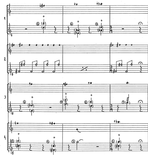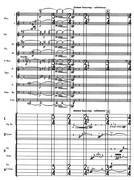research

Design and construction of four
Micro-intervallic Guitars and composition of original works for these
instruments
Artistic creation, theoretical investigation and new instrument design converge in this project, which main goal is to provide the theoretical basis and material context for new music composition with micro-intervallic systems.
Four Guitars, able to produce different micro-intervalic pitch systems, will be designed from a perspective informed by the study of the existing theoretical corpus. Uruguayan luthiers will later be hired to build these Micro-intervallic Guitars. Taking advantage of the singular nature of these instruments, experimental approaches to pitch organization in music composition will be explored, leading to the development of original micro-intervallic systems and compositional models. A set of micro-intervallic studies for different combinations of Guitars will be then composed, performed and recorded. Pedagogic materials will also be produced in the context of this project.
This project is done with a I+D grant from CSIC-UdelaR. Research team members are Osvaldo Budón, Fabrice Lengronne y Gonzalo Pérez.
Artistic creation, theoretical investigation and new instrument design converge in this project, which main goal is to provide the theoretical basis and material context for new music composition with micro-intervallic systems.
Four Guitars, able to produce different micro-intervalic pitch systems, will be designed from a perspective informed by the study of the existing theoretical corpus. Uruguayan luthiers will later be hired to build these Micro-intervallic Guitars. Taking advantage of the singular nature of these instruments, experimental approaches to pitch organization in music composition will be explored, leading to the development of original micro-intervallic systems and compositional models. A set of micro-intervallic studies for different combinations of Guitars will be then composed, performed and recorded. Pedagogic materials will also be produced in the context of this project.
This project is done with a I+D grant from CSIC-UdelaR. Research team members are Osvaldo Budón, Fabrice Lengronne y Gonzalo Pérez.

“Transmutations”
of Edgard Varèse's musical language in new music from Argentina
1965-1985
The work of Edgard Varèse (Paris, 1883 - New York, 1965) met a particularly favorable reception in the region of the Rio de la Plata. As a direct consequence of that, certain elements of his musical language became important referential models for some young Argentine musicians.
The goal of this research project was to identify manifestations of the creative impact of Edgard Varèse in a selection of pieces—produced between 1965 and 1985— by Argentinian composers: Eduardo Bértola (Coronel Moldes, 1939-Belo Horizonte, 1996), Mariano Etkin (Buenos Aires, 1943), Dante Grela (Rosario, 1941), Alcides Lanza (Rosario, 1929), y Graciela Paraskevaídis (Buenos Aires, 1940).
This project was funded by the Cultural Center of Spain in Buenos Aires (CCEBA), through the program "Research Grants. Contemporary Music - 2006 ".
The work of Edgard Varèse (Paris, 1883 - New York, 1965) met a particularly favorable reception in the region of the Rio de la Plata. As a direct consequence of that, certain elements of his musical language became important referential models for some young Argentine musicians.
The goal of this research project was to identify manifestations of the creative impact of Edgard Varèse in a selection of pieces—produced between 1965 and 1985— by Argentinian composers: Eduardo Bértola (Coronel Moldes, 1939-Belo Horizonte, 1996), Mariano Etkin (Buenos Aires, 1943), Dante Grela (Rosario, 1941), Alcides Lanza (Rosario, 1929), y Graciela Paraskevaídis (Buenos Aires, 1940).
This project was funded by the Cultural Center of Spain in Buenos Aires (CCEBA), through the program "Research Grants. Contemporary Music - 2006 ".

Musicians and their record collections [Las discotecas de los músicos]
A series of radio programs, each one is a "visit" to the record collection of a professional musician. The guest and the program hosts establish a conversation which revolves around a selection of musics chosen from the guest´s collection. Each program offers the portrait of the musical universe of a guest musician, and an original playlist that enables the discussion of a variety of musical, historical and cultural issues. The guest list is representative of a broad spectrum of popular and art music of Uruguay.
This project takes place in the context of the Community Outreach Program of the School of Music of the National University [Escuela Universitaria de Música-Universidad de la República] in collaboration with the Faculty of Information and Communication [Facultad de Infomación y Comunicación], and UNI Radio, the University Radio.
This series of radio programs will provide material for further research work. Project coordinators are Osvaldo Budón, Leonardo Croatto and Alexander Laluz.
A series of radio programs, each one is a "visit" to the record collection of a professional musician. The guest and the program hosts establish a conversation which revolves around a selection of musics chosen from the guest´s collection. Each program offers the portrait of the musical universe of a guest musician, and an original playlist that enables the discussion of a variety of musical, historical and cultural issues. The guest list is representative of a broad spectrum of popular and art music of Uruguay.
This project takes place in the context of the Community Outreach Program of the School of Music of the National University [Escuela Universitaria de Música-Universidad de la República] in collaboration with the Faculty of Information and Communication [Facultad de Infomación y Comunicación], and UNI Radio, the University Radio.
This series of radio programs will provide material for further research work. Project coordinators are Osvaldo Budón, Leonardo Croatto and Alexander Laluz.

Henry Cowell and Edgard Varèse: Sound as a Model for Musical Invention
During the first decades of the last century, Edgard Varèse (1883-1965) and Henry Cowell (1897-1965) laid the foundations for a compositional praxis informed by the scientific observation of sound. Taken as a whole, their artistic and theoretical work formed a corpus which contained some fundamental ideas that underlie much of the production of the avant-garde of the second half of the twentieth century.
The contribution of these composers to the development of twentieth-century musical thought has not yet been fully appraised. More specifically, the extent to which these musicians have contributed to the emergence of "spectral" thinking is a topic that only in recent years has begun to receive academic attention.
In this research project, I aim at providing analytical and historical data that would help demonstrate that the work of Cowell and Varèse constitutes a fundamental historical precedent of what is known as "Spectral thought." I also expect to make a contribution towards discerning the creative impact of their work on the music of the Americas during the second half of the twentieth century and, furthermore, to the identification of a genealogy of composers that used sound as a model for musical invention.
During the first decades of the last century, Edgard Varèse (1883-1965) and Henry Cowell (1897-1965) laid the foundations for a compositional praxis informed by the scientific observation of sound. Taken as a whole, their artistic and theoretical work formed a corpus which contained some fundamental ideas that underlie much of the production of the avant-garde of the second half of the twentieth century.
The contribution of these composers to the development of twentieth-century musical thought has not yet been fully appraised. More specifically, the extent to which these musicians have contributed to the emergence of "spectral" thinking is a topic that only in recent years has begun to receive academic attention.
In this research project, I aim at providing analytical and historical data that would help demonstrate that the work of Cowell and Varèse constitutes a fundamental historical precedent of what is known as "Spectral thought." I also expect to make a contribution towards discerning the creative impact of their work on the music of the Americas during the second half of the twentieth century and, furthermore, to the identification of a genealogy of composers that used sound as a model for musical invention.

Seeds for a Canadian Experimental Music Tradition: The compositions of James Tenney between 1975 and 2000, and their significance in the context of Canadian Music of the late 20th Century
James Tenney (1934-2006) is a key figure to understand the nature and value of what has been called the (North)American Experimental Music Tradition. His work spans a wide range of musical investigation, which includes his pioneering work in computer music composition, alternative tuning systems, expanded harmonic theory, music perception, and the combination of instrumental and electroacustic devices in mixed compositions.
In 1975 Tenney moved to Canada to join the Music Faculty at York University in Toronto. At this institution—where he was named Distinguished Research Professor in 1994—he carried out research and taugth music composition, theory, and 20th century music history until his retirement in 2000. The Canadian contemporary music scene fostered Tenney's creativity, who, between 1975 and 2000 completed a body of work that represents an important contribution to Canadian music of the late 20th century. Through his academic and artistic activity, Tenney became a strong reference for many younger Canadian musicians and thus contributed to define certain features of present-day music creation in Canada.
This research project had as its main goals:
a) To give an analytical account of the evolution of James Tenney's compositional production between 1975 and 2000.
b) To evaluate the significance of Tenney's work in the context of Canadian music in the last quarter of the 20th century.
Research work included musical analysis of selected compositions and interviews with a number of Canadian composers, performers and scholars who worked with, studied with or performed music by James Tenney between 1975 and 2000.
This project was funded by the International Council for Canadian Studies, through the Canadian Studies Faculty Enrichment Award Program.
James Tenney (1934-2006) is a key figure to understand the nature and value of what has been called the (North)American Experimental Music Tradition. His work spans a wide range of musical investigation, which includes his pioneering work in computer music composition, alternative tuning systems, expanded harmonic theory, music perception, and the combination of instrumental and electroacustic devices in mixed compositions.
In 1975 Tenney moved to Canada to join the Music Faculty at York University in Toronto. At this institution—where he was named Distinguished Research Professor in 1994—he carried out research and taugth music composition, theory, and 20th century music history until his retirement in 2000. The Canadian contemporary music scene fostered Tenney's creativity, who, between 1975 and 2000 completed a body of work that represents an important contribution to Canadian music of the late 20th century. Through his academic and artistic activity, Tenney became a strong reference for many younger Canadian musicians and thus contributed to define certain features of present-day music creation in Canada.
This research project had as its main goals:
a) To give an analytical account of the evolution of James Tenney's compositional production between 1975 and 2000.
b) To evaluate the significance of Tenney's work in the context of Canadian music in the last quarter of the 20th century.
Research work included musical analysis of selected compositions and interviews with a number of Canadian composers, performers and scholars who worked with, studied with or performed music by James Tenney between 1975 and 2000.
This project was funded by the International Council for Canadian Studies, through the Canadian Studies Faculty Enrichment Award Program.
